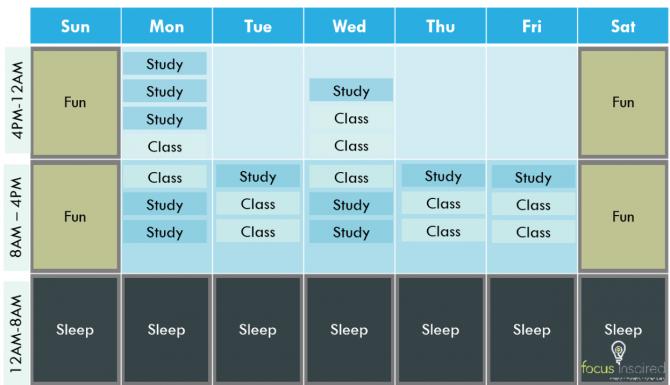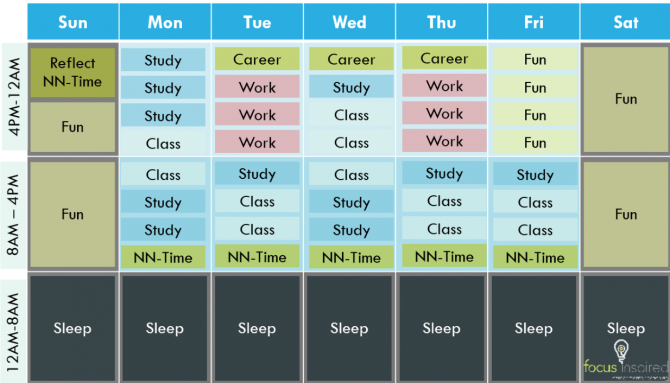The transition from high school to post-secondary school often comes with more commitments. In addition to the typical homework, assignments, tests, and exams from school, there might be a part-time job to pay for those expensive books and tuition. Perhaps even household chores. And you have to spend time enjoying your post-secondary experience. All of this is great in moderation.
However, it’s also important not to over-extend yourself on any one thing. This can get in the way of other things that you prioritize. The goal is to create a model week for how you want to spend your time. Then track yourself against it. And you’ll want to adjust it yearly, or every term, to make sure you have the right balance for the current career stage you are in.
Here’s a tactical guide I put together to help you manage your time.
Add 8 hours/day for sleep
You might only need 6 or 7 hours, but I would encourage you not to plan below 6 hrs. Scientific research proves how lack of sleep can impair you the same as alcohol. You might not feel it if you’re used to it, but that doesn’t mean you won’t perform better with more sleep. If there are exceptional circumstances or the pressure gets to you and you only have 4 hrs of sleep, forgive yourself. Learn what you can do better next time and move on. Just don’t make it a habit.
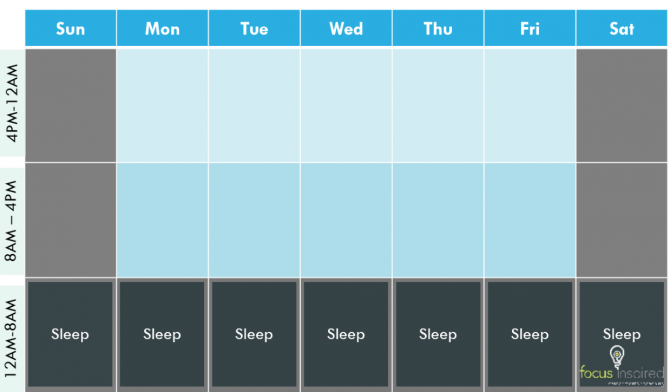
Block off your weekends
Set aside your weekends as a mix of time for yourself, friends and family. You pick what the proportion will be between these various groups. That doesn’t mean you can only have fun on the weekends, but it gives you time specifically for fun. This is especially important for workaholics who only spend time studying and don’t take time to enjoy their post-secondary experience!
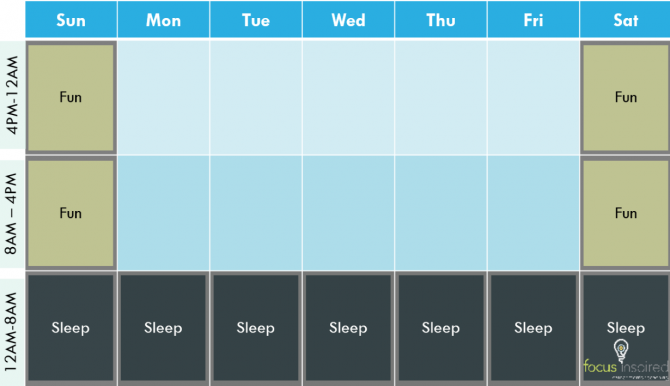
Class schedule
Now that you have some of the basic time set aside, continue with your class schedule. Depending on your program and course load, you might have something like 20-40 hrs worth of lectures, labs, and other class time.
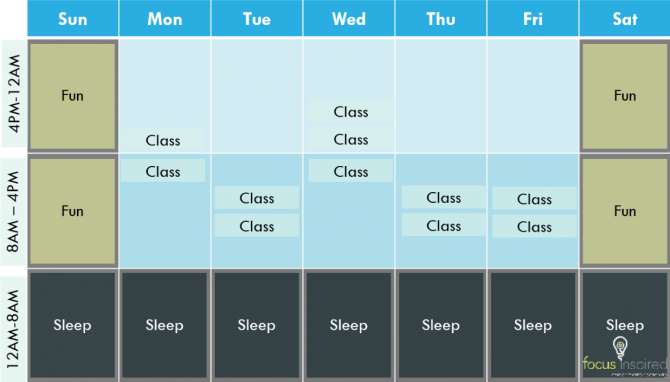
For each class, add an equivalent number of hours to do work for assignments and studying.
If you have 3 hrs of lecture for a single class, then you should allocate 3 hrs/week to work on that class. You can break this up into 60-90 minute blocks. For optimal learning and memory, you should allocate the time to review that material 1 hr after, then 1 day after, then 1 week after, then 1 month after, then 1 year after… to improve your retention overall.
By the end, you should have 30-50 hrs allocated between all of your classes and studying. NOTE that for a working professional, this is almost the equivalent of a 9-5 regular job. Consider including travel time. By including this time, you can see a more accurate picture.
Block off any other commitments
If you have a part-time job, include it. If you are volunteering or doing extracurriculars, put the time in for those. Even if your work schedule shifts from week to week, keep in mind that we’re not strictly using this. We’re using it as an estimated guide for how we want to spend our days to reach our goals.
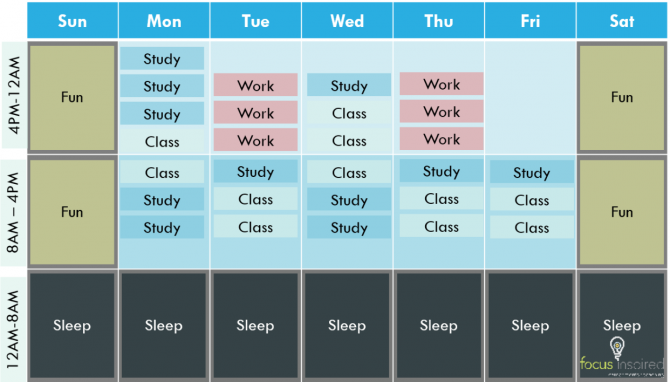
Block off 30-60 mins/day for non-negotiable time (NNT)
This is the time you spend on your own personal and professional development. These are activities that are important to accomplish. The NNT becomes your time to start getting all of that done. You might want to use this time to:
-
Journal
-
Read
-
Meditate
-
Exercise
-
Plan and cook nutritious meals
-
Research
-
Learn a language or instrument
-
Volunteer
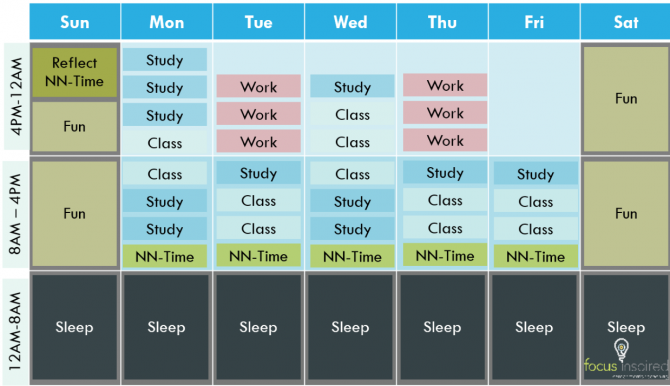
Now that your model week is set up, what do you do with it? How about taking some of your NNT every week to reflect on how you spend your time?
Recall how you spent your days last week. Have you spent the time where you wanted to? If yes, then high-five yourself and keep ongoing. If not, then reflect back on how you actually spent that time.
Here are some additional items you could and should add:
Extra time
By now, you would have whittled down the 168-hour workweek to something like 20-40 hrs a week. Do you have extra time for important things such as:
-
Job seeking: Writing resumes and cover letters, or practicing interview questions and networking
-
Getting experience: Volunteering, self-study, freelancing.
-
Career exploration: You might not know exactly what you want to do after graduation, so explore your options.
-
Extra time for fun!
Do you have any time left?
If at any point you no longer have any more time in your calendar, then you’ll want to make some hard decisions on what you take out.
If you’re really keen, colour code the time chart. One colour for your main priorities that cannot be moved. Other colours for the ones that are flexible. I’d recommend the following as priorities:
-
High priority: School and sleep
-
Medium priority: Studying, part-time jobs, NN-time, and job-searching
-
Low priority (could be removed if necessary): Weekend time
Here are some useful rules to manage your time:
For high priority items, they can only be moved, NOT removed. If you really want to spend time with friends and family during the week, then proactively swap hours with the current weekend. In proactive swapping, you do the work first then get to take the time off. So if you have an event to go to next week when you’re normally studying for 3 hrs, then you should spend this Saturday studying for 3 hrs FIRST. Then you can take the time off to go out.
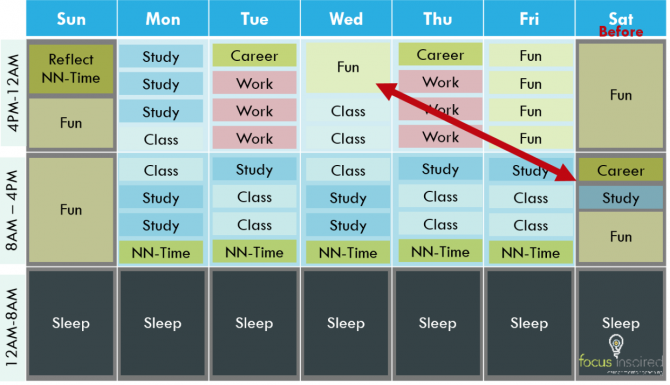
For any new activities you are asked to do or spend time on, ask yourself:
- Do I have the time? If the answer is no, then you stop right there. If it’s yes, then keep asking:
- Do I want to give up that time? Perhaps the activity isn’t something you really want to do or isn’t something you’ll truly benefit from now or in the long term.
- Under what circumstances would I want to give up the time? Perhaps the activity has to be an exceptionally epic once-in-a-lifetime activity. Or something that you truly love.
Frequently Asked Questions (FAQ)
Do you really expect me to follow this schedule exactly?
No. It would be unreasonable for you to follow the schedule exactly. The exercise of planning an ideal schedule AND, more importantly, reflecting on it is important. Planning the schedule forces you to think about what you are prioritizing. If you want to spend more time playing Fortnite or watching Netflix, then that’s great! However, if your goals are to secure a summer internship and get a 4.0 average, then you better be making effective use of the time you have. Reflecting on the time you have spent might actually be more important than making the plan in the first place.
Do I have to track to the minute?
No. We want to be in the spirit of what we’re looking to accomplish. If you have an extra hour here and there for stuff that you shouldn’t be doing once in a while, it’s not that big of a deal. However, if it starts being chronic and consistent, then you may want to re-evaluate.
I find myself going down the social media and YouTube rabbit hole where 10 minutes turns into 3 hrs. What can I do?
Schedule your procrastination time. Yes, you heard me right. Social media and YouTube time is fine. Give yourself 30-60 minutes to go through your feeds, like/comment/share, and post. The benefit is that if you’re supposed to be studying now, you can catch yourself and say, “Ok, stop. I’ve blocked off time in an hour to do my social stuff. Let me get back to what I should be doing, then I’ll have plenty of time later.”
I don’t find I have the willpower to do the extra stuff that I want late in the day. What can I do?
Go to bed earlier and do it in the morning. Research has found that willpower acts kind of like a power meter in a video game. When you wake up, your power bar is full. As you go through the day, it gets depleted by the decisions you have to make and by the things you do. The interesting part is that once you get that important stuff done, it often gives you a power up so your willpower isn’t as depleted as you might think.

Listening Is The New Reading
*Opinions expressed are those of the author, and not necessarily those of Student Life Network or their partners.

